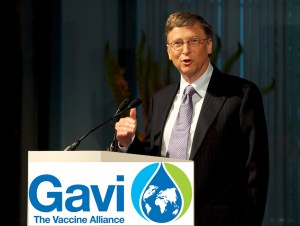Corporate Philanthropy & the Gates Foundation: Global Vaccine Program Conflicts of Interest
by Rishma Parpia
The Vaccine Reaction

Accountability and Conflicts of Interest
Concerns have been raised regarding the foundation’s lack of accountability and conflicts of interest with multinational corporations. Although the BMGF spends only 5% of its annual global health budget on lobbying and advocacy, this 5%, which translates into over $100 million speaks volumes on the political power held by the foundation. [4] The BMGF funds scientific research, including new vaccine development, and also gives significant amounts of money to institutions ranging from universities to non-governmental organizations. It is also the single largest donor to the World Health Organization (WHO). [2] [4]
In 2015, the BMGF contributed 11% of the WHO’s entire budget. [2] In 1999, the foundation committed $750 million over a 5-year period as seed money to launch the Global Alliance for Vaccine and Immunization (GAVI), [5] an international organization committed to “improve access to new and underused vaccines to children in low-income countries.” [6] Since 2000, the foundation has contributed $2.5 billion to GAVI. [2] Interestingly, according to the Global Justice Now report “members of the GAVI board always include companies in the International Federation of Pharmaceutical Manufacturers, which involves GlaxoSmithKline, Merck, Novartis, and Pfizer, among others.” [2]
These types of public-private partnerships no doubt gives the Bill & Melinda Gates Foundation considerable leverage in influencing health policy priorities in the U.S. and other countries, which creates both perceived and real conflicts of interest. [4] Gregg Gonsalves, an long time AIDS activist and co-founder of the International Treatment Preparedness Coalition voices his concern about the power of the BMGF:
It’s not a democracy. It’s not even a constitutional monarchy. It’s about what Bill and Melinda want. We depend on them learning, and it’s not as if there are many points of influence for this. [4]
The BMGF is heavily intertwined with corporate America. Most of the senior staff employed at the foundation have previously worked at multinational corporations. [2] [4]
This is particularly common with the BMGF’s health programs whereby former pharmaceutical industry executives lead the work rather than public health professionals. [2] To name a few examples, Sue Desmond-Hellman, CEO of the BMGF, previously held a senior position as President of Product Development for 14 years at Genentech, a biotechnology company. [2] Genentech and GlaxoSmithKline also employed the current COO of the BMGF, Leigh Morgan. [2] There are several more such examples highlighted in the Global Justice Now report.

